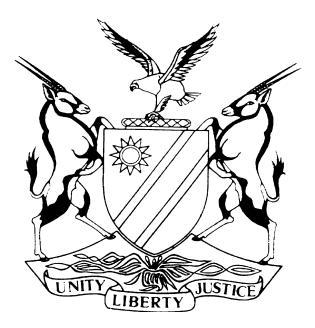3
REPUBLIC OF NAMIBIA

IN THE HIGH COURT OF NAMIBIA, MAIN DIVISION, WINDHOEK
REVIEW JUDGMENT
PRACTICE DIRECTIVE 61
Case Title: The State v Riaan Griffiths | Case No: CR 50/2023 | |
High Court MD Review No:2223/2022 | Division of Court: High Court, Main Division | |
Coram: Liebenberg J et Christiaan AJ | Delivered: 25 April 2023 | |
Neutral citation: S v Griffiths (CR 50/2023) [2023] NAHCMD 219 (25 April 2023) | ||
ORDER:
| ||
REASONS FOR ORDERS: | ||
LIEBENBERG J (CHRISTIAAN AJ concurring): [1] Before court is a review record from the Magistrate’s Court for the district of Otjinene where the accused was convicted and sentenced on his plea of guilty for possession of dependence producing substances – contravening s 2(b) of Act 41 of 1971 (‘the Act’). The particulars of the charge were that upon or about 30 November 2022 and at or near du Plessis, in the district of Otjinene, the accused did unlawfully have in his possession or use, a dependence-producing drug or plant from which such drug can be manufactured, to wit 40 grams of ‘skunk’ to the value of N$2000. Accused was sentenced to pay a fine of N$10 000 or 24 months’ imprisonment. [2] The following query was directed to the trial court: ‘The dependence-producing substance allegedly found in the accused’s person, as per the charge to which he pleaded guilty, is ‘skunk’. Whereas ‘skunk’ is not defined in the Act as a prohibited substance, is the charge not defective? And can such defect be cured during s 112(1)(b) questioning?’ [3] In response, the magistrate concedes that ‘skunk’ is not listed in any part of the Schedule. The magistrate places reliance for the conviction of the accused on his admissions during the s 112(1)(b) questioning. According to the trial court, accused told the court he knew what he had in his possession was cannabis and that in any event, although not defined in the Act, ‘skunk’, still remains a prohibited substance. [4] Reference in the charge annexure and conviction is made to ‘skunk’ as opposed to cannabis. ‘Skunk’ does not appear in Part 1 of the Schedule as a prohibited substance, meaning that the conviction of the offence as charged is not in accordance with justice. The charge is defective for alleging that the accused was found in possession of ‘skunk’. During the court’s questioning, the accused admitted to all the elements of the offence of possession of a dependence-producing substance, to wit ‘skunk’. Notwithstanding that ‘skunk’ is not defined in the Act, the defective charge was put to the accused. The accused was thus convicted on a defective charge as far as it concerns the possession of ‘skunk’. [5] The admissions made by the accused during the trial court’s s 112(1)(b) questioning do not constitute evidence, they are merely admissions which remain as such and do thus, not salvage the defect in the charge. The conviction therefore stands to be set aside. [6] On account of the charge being defective, and, the conviction consequently being set aside, the sentence imposed cannot stand and similarly, falls to be set aside. [7] In the result, the following order is made:
| ||
J C LIEBENBERG JUDGE | P CHRISTIAAN ACTING JUDGE | |
Cited documents 1
Legislation 1
| 1. | Abuse of Dependence-Producing Substances and Rehabilitation Centres Act, 1971 | 190 citations |